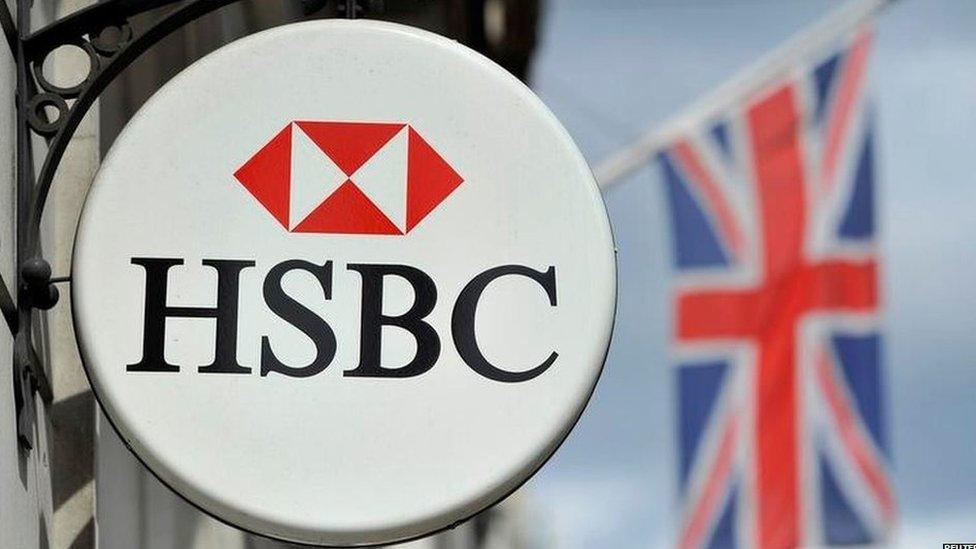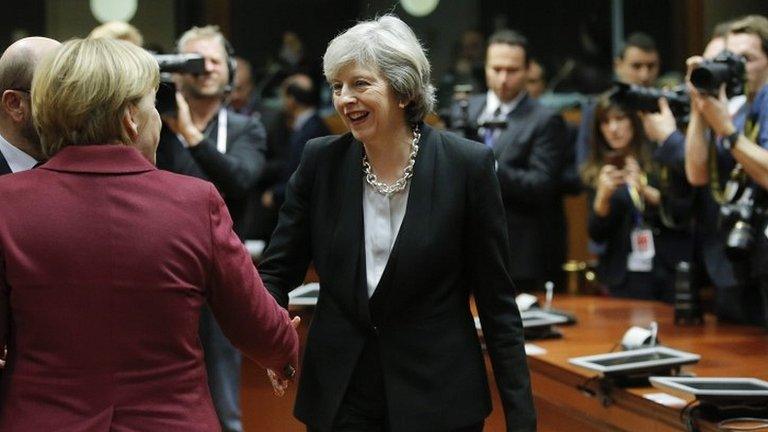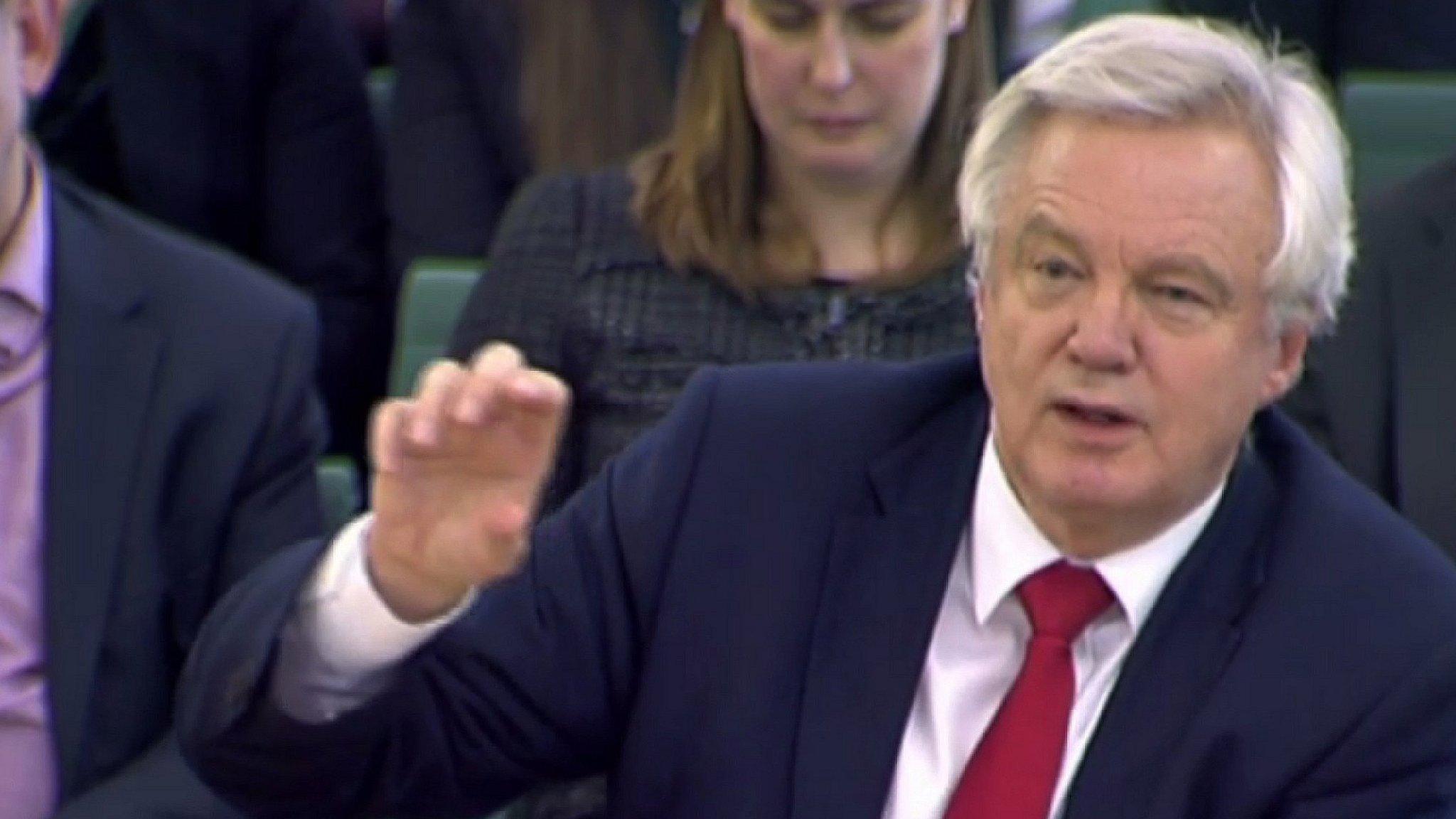Brexit: Warning firms could leave City over uncertainty
- Published

The City's loss could be Wall Street's gain, the report warns
Financial services firms could quit the City unless a transitional Brexit deal is secured, ministers have been warned.
A cross-party group of peers said Britain's financial sector must be offered a Brexit "bridge" to prevent firms moving to rival locations such as New York, Dublin, Frankfurt or Paris.
It urged the government to act to stop business tumbling off a "cliff edge".
It comes as Prime Minister Theresa May prepares to meet other EU leaders at a summit meeting in Brussels.
Mrs May will take part in EU-wide discussions on defence, foreign affairs, migration and the economy as well as holding bilateral meetings with the leaders of Latvia and Lithuania and the president of the European Parliament.
However, she will not be present for a dinner on Thursday evening - at which the EU's remaining 27 leaders are expected to discuss their approach to Brexit.
In other Brexit developments:
The Lib Dems say the UK's promise to leave the jurisdiction of the European Court of Justice would endanger vital cooperation against crime
The European Parliament could start parallel negotiations with the UK unless it is given more of a say by EU leaders, a leading MEP says
The Foreign Affairs Committee urges ministers to reconsider their reluctance to share their thinking on the risks of no deal being reached
The UK is expected to begin official negotiations on the terms of its exit this Spring following the Leave vote in June's referendum.
Businesses are pushing for an interim arrangement to safeguard the interests of companies, investors and customers during the period between the UK's departure and when post-Brexit trading and regulatory arrangements are settled.
In the latest of a series of Lords Committee reports on Brexit, its EU financial affairs sub-committee said firms could decide to remove their operations from London because of uncertainty about what kind of agreement would be negotiated for cross-border trade.

Analysis by Simon Jack, the BBC's business editor

There are many definitions of what such a Brexit transition might look like.
Is it merely an implementation period for a largely agreed deal or is it a longer term arrangement that keeps the status quo in place while details are worked out more slowly?
Either way, the pressure for more clarity is growing. The Lords Committee is warning that thousands of banking jobs will go to Europe if some sort of transition deal is not made ready.
Lobbying group TheCityUK will endorse that view and privately bankers are finalising contingency plans and some are close to pressing "Go".
The chairman of HSBC, Douglas Flint, has told Bloomberg TV that the bank was looking at the option of moving staff to Paris if needed.
As one source told me: "There is no enthusiasm for leaving. Banks are looking for excuses to stay."
We'll soon see whether the sudden warmth towards a transitional deal is excuse enough.

Baroness Falkner, the Lib Dem peer who chairs the committee, said that while she did not detect any sense of panic in the City, it was important "red lines" were set out in areas such as passporting rights, which London firms need in order to trade freely across EU.
"Companies may decide that uncertainty is too high a price to pay so they might as well move to Dublin, they might as well move to Frankfurt - that is our great concern."
Passporting
The Lords urged businesses to strengthen the government's negotiating hand by sharing internal analysis about their passporting rights as soon as possible.
It said a failure to do so could leave companies seeking equivalent provisions that are "patchy, unreliable and vulnerable to political influence".
However, it said building a detailed picture may prove a challenge for the government because some City firms do not fully understand their reliance on passporting.
"The committee got a sense that [government] engagement has been sporadic and it should be more consistent and there ought to be a clearer view," Baroness Falkner said.
The Lords also stressed the importance of firms being able to seamlessly move staff around Europe to ensure they and the growing FinTech sector continued to thrive.
Speaking on Friday, Mr Davis said his over-arching goal was "maximum access to markets with the minimum disruption" to firms as part of a "smooth and orderly" exit.
He said a transitional agreement was possible "if necessary" but he believed both sides should be able to conclude a full EU withdrawal agreement within the 18-month timeframe set out by EU negotiators.
- Published15 December 2016

- Published14 December 2016

- Published24 November 2016
